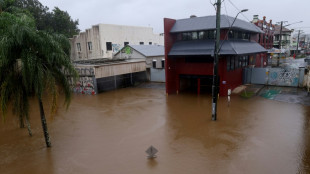
-
 Russian disinformation 'infects' AI chatbots, researchers warn
Russian disinformation 'infects' AI chatbots, researchers warn
-
'Quite sad': Renters turn to lottery in Spain's housing crisis

-
 Indonesians seek escape as anger rises over quality of life
Indonesians seek escape as anger rises over quality of life
-
Iran says won't negotiate under 'intimidation' as Trump ramps up pressure

-
 7-Eleven, Couche-Tard explore sell-offs ahead of potential merger
7-Eleven, Couche-Tard explore sell-offs ahead of potential merger
-
Trump admin detains pro-Palestinian campus protest leader

-
 Japan auctions emergency rice reserves as prices soar
Japan auctions emergency rice reserves as prices soar
-
Hong Kong, Shanghai lead losers on mixed day for Asian markets

-
 China-US trade war heats up as Beijing's tariffs take effect
China-US trade war heats up as Beijing's tariffs take effect
-
7-Eleven to explore sell-offs with Couche-Tard ahead of potential merger

-
 'So important': Selma marks 60 years since US civil rights march
'So important': Selma marks 60 years since US civil rights march
-
Black comedy from award-winning 'Parasite' director tops N.America box office

-
 EU chief sees US as 'allies' despite 'differences'
EU chief sees US as 'allies' despite 'differences'
-
French research groups urged to welcome scientists fleeing US

-
 Journalist quits broadcaster after comparing French actions in Algeria to Nazi massacre
Journalist quits broadcaster after comparing French actions in Algeria to Nazi massacre
-
Highlights from Paris Women's Fashion Week

-
 US ends waiver for Iraq to buy Iranian electricity
US ends waiver for Iraq to buy Iranian electricity
-
China-US trade war heats up with Beijing's tariffs to take effect

-
 Greenland's Inuits rediscover their national pride
Greenland's Inuits rediscover their national pride
-
Floods, mass power cuts as wild weather bashes eastern Australia

-
 Wild weather leaves mass blackouts in Australia
Wild weather leaves mass blackouts in Australia
-
China consumption slump deepens as February prices drop

-
 Phone bans sweep US schools despite skepticism
Phone bans sweep US schools despite skepticism
-
Some 200 detained after Istanbul Women's Day march: organisers

-
 'Grieving': US federal workers thrown into uncertain job market
'Grieving': US federal workers thrown into uncertain job market
-
Remains of murdered Indigenous woman found at Canada landfill

-
 Women will overthrow Iran's Islamic republic: Nobel laureate
Women will overthrow Iran's Islamic republic: Nobel laureate
-
Women step into the ring at west African wrestling tournament

-
 Trump's tariff rollback brings limited respite as new levies loom
Trump's tariff rollback brings limited respite as new levies loom
-
Hackman died of natural causes, a week after wife: medical examiner

-
 Oops, we tipped it again: Mission over for sideways US lander
Oops, we tipped it again: Mission over for sideways US lander
-
Cyclone Alfred downgraded to tropical low as it nears Australia

-
 Global stocks mixed as Trump shifts on tariffs weighs on sentiment
Global stocks mixed as Trump shifts on tariffs weighs on sentiment
-
Trump says dairy, lumber tariffs on Canada may come soon

-
 Trump cuts $400 mn from Columbia University over anti-Semitism claims
Trump cuts $400 mn from Columbia University over anti-Semitism claims
-
US Fed chair flags policy uncertainty but in no rush to adjust rates

-
 Adopted orphan brings couple 'paradise' in war-ravaged Gaza
Adopted orphan brings couple 'paradise' in war-ravaged Gaza
-
Oops, we tipped it again: Mission over for private US lander

-
 Greenland's mining bonanza still a distant promise
Greenland's mining bonanza still a distant promise
-
Pope 'stable' as marks three weeks in hospital with breathless audio message

-
 Shares slump on Trump tariffs tinkering, jobs
Shares slump on Trump tariffs tinkering, jobs
-
Mission over for private US lander after wonky landing

-
 Thousands stranded as massive WWII bomb blocks Paris train station
Thousands stranded as massive WWII bomb blocks Paris train station
-
UK court cuts longest jail terms on activists, rejects 10 appeals

-
 US hiring misses expectations in February as jobs market faces pressure
US hiring misses expectations in February as jobs market faces pressure
-
S.Sudan heatwave 'more likely' due to climate change: study

-
 US company says Moon mission over after landing sideways again
US company says Moon mission over after landing sideways again
-
Trump says farmers keen to quit 'terrible' S. Africa welcome in US

-
 US stock markets rise as investors track Trump tariffs, jobs
US stock markets rise as investors track Trump tariffs, jobs
-
US hiring misses expectations in February, jobs market sees pressure


Tunisian 'hanging garden' farms cling on despite drought
High in the hills of northwestern Tunisia, farmers are tending thousands of fig trees with a unique system of terracing they hope will protect them from ever-harsher droughts.
But the "hanging gardens" of Djebba El Olia have been put to the test this year as the North African country sweltered through its hottest July since the 1950s.
That has exacerbated a long drought that has left Tunisia's reservoirs at just a third of their capacity.
The gardens are supplied with water from two springs high in the mountains.
The water is fed into the orchards by a network of canals that are opened and shut at set times, according to the size of the orchard.
Crucially, a wide variety of crops provides resilience and in-built pest control, unlike the monocultures that dominate modern agriculture and require huge inputs of pesticides to survive.
"We grow figs but also other trees like quinces, olives and pomegranates, and beneath them we plant a wide range of greens and legumes," said activist Farida Djebbi as insects buzzed between thyme, mint and rosemary flowers.
Djebbi pointed out some of the channels, which irrigate the area's 300 hectares (740 acres) of steeply sloping orchards.
In 2020, the Food and Agriculture Organization recognised the system as an example of "innovative and resilient agroforestry", adding it to an elite list of just 67 "Globally Important Agricultural Heritage Systems".
The system "has been able to adapt and take advantage of an inhospitable topography", the UN agency said.
"Through the use of natural geological formations and the use of stones, local communities have been able to transform the landscape into fertile and productive lands."
The FAO praised the diversity of local crop varieties grown by the area's farmers, as well as their use of wild plants to repel potential pests and of livestock to "plough" and fertilise the soil.
- Growing up with figs -
While nobody knows exactly how old the system is, human habitation in the area predates the Carthaginian civilisation founded in the ninth century BC.
But while it may have endured for generations, the system is under threat as climate change kicks in.
Activist Tawfiq El Rajehi, 60, says the flow of water from springs irrigating the area has dropped off noticeably, particularly in the past two years.
Unlike in previous years, the surrounding peaks no longer get covered in snow each winter, and the leaves of many of the trees in the lower part of Djebba are yellowing and sick.
Rajehi, a teacher at the local school, said climate change and low rainfall were compounded by another factor: farmers favouring cash crops.
"Some farmers have moved to growing more figs instead of less water-intensive crops because figs have become more profitable in recent years," he said.
"We need to keep a good balance and variety of plants."
Nevertheless, residents say they are proud of their heritage.
Farmer Lotfi El Zarmani, 52, said there was also growing demand for Djebba figs, which were given a protected designation of origin by the agriculture ministry in 2012 -- still the only Tunisian fruit to enjoy the certification.
"They're getting a reputation, plus exporting them has become easier, plus they bring higher prices," Zarmani said, adding that most exports go to the Gulf or neighbouring Libya.
Rajehi's daughter, university student Chaima, put on protective gloves as she set out to harvest the fruit from her family's small lot.
"Figs are more than a fruit for us. We're born here among the fig trees and we grow up with them, we learn from a young age how to look after them," the 20-year-old said.
Djebbi is working to persuade farmers to preserve traditional ways of processing the products harvested in the area.
She is working with 10 other women on a cooperative that distils essence from wildflowers, dries figs, and produces fig and mulberry jam.
"Products we learnt how to make from our mothers and grandmothers are becoming popular because they're of such high quality," she said.
Ng.A.Adebayo--CPN
